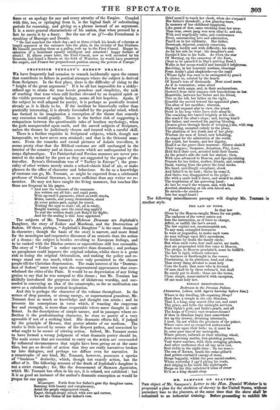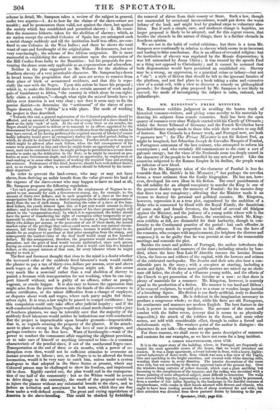ME. SAMPSON ON SLAVERY.
Tern object of Mr. Sampson's Letter to the Hon. Daniel Webster is to propound a plan for the abolition of slavery in the United States, without pecuniary loss to the planters, at the same time that the slave shall be submitted to an industrial training. Before proceeding to exhibit hie
scheme in detail, Mr. Sampson takes a review of the 'subject in general, under two aspects—I. As to how far the claims of the slave-owner are tenable; and he pronounces them valid, not against the slave, but against the society which has established and permitted slavery : 2. He consi- ders the measures hitherto taken for the abolition of slavery; which, as no nation except the revolted Colonies of Spain has yet attempted such -a social change suddenly and till the institution itself was effete, are con- fined to our Colonies in the West Indies; and there he shows the total want of care and forethought of the original plan. He denounces, but not very convincingly, the scheme of free African emigration. He is more smccessful in establishing the abuses attendant upon the exportation of the Hill Coolies from India to the Mauritius : but his proposals for pre- -venting the abuse seem only applicable as an argumentunt ad absurdum. Neither is the plan suggested to Mr. Webster for the abolition of Southern slavery. of a very practicable character. Mr. Sampson lays down in broad terms the proposition that all men are averse to remove from their place of birth or accustomed residence, and that this is espe- ,cially the case with the Negro. Upon this axiom he bases his proposal ; which is, to make the liberated slave do a certain amount of work under pain of banishment to Africa, "the country in which alone he can right- fully claim a residence,"—though what right the mixed breeds have to Africa over America- is not very clear ; nor does it seem easy to fix the precise district—to determine the "settlement" of the slaves of pure Negro descent, since "Africa" is a wide place. The mode of working the project is thus described. "Towards this end, a general registration of the Coloured population should be eitbcted, and an amount of labour equal to the average labour of a slave should be fixed as the daily 'task' of each. At the end of every three or six months, the Negro should be required to deliver or to transmit to an officer, appointed by the -Government for that purpose, a certificate or certificates from the employer whom he may have served, of his having performed the required amount of labour (of course bodily infirmity would prove an exemption) during the specified period; failing in which, he should he declared liable to deportation. Further details as to any grace which might be allowed after such failure, when the full consequences of his -course were presented to him and when he might desire an opportunity of amend- ment, need not be considered here: he might perhaps be permitted in a second three months to make up the defalcation in the first; or he might be received on pro-. bation at some Government-depOt, and allowed an opportunity, by employment at road-making or in some other manner, of working the required time and averting his sentence. Forbearance of this kind, however, should have well-defined limits; and, as an example to others, a second offence should be followed by his imme- diate departure."
In order to prevent the land-owner, who may or may not have slaves, from deriving an unfair benefit from the value given to his land at the expense of the slave-owner who may happen to have no land at all, Mr. Sampson proposes the following regulation.
"Let each person granting certificates of the employment of Negroes be re- quired to use annually for each a Government-stamp, say, for example, to the amount of thirty-two dollars; and to each proprietor of a slave at the date of emineipation let there he given a deed of exemption (to be called a compensation- deed) from the use of such stamp. Estimating the value of a slave at five hun- dred dollars, the yearly interest upon this at 6 per cent would amount to thirty dollars; and in order that the marketable nature of his slave property might still attach to the 'compensation-deed,' by which it is represent4 the holder should have the power of transferring his right of exemption either temporarily or per- manently to others. As no one would be able to employ a Negro without paying thirty-two dollars per annum, or the possession of one of these deeds the annual market-value of the privilege they convey could never, under any natural circum- stances, fall below thirty or thirty-one dollars; because it would always be de- sirable for an employer to purchase at that price exemption from the stamp, and consequently the market-value of the deed itself would stand at five hundred dollars. By this arrangement, therefore, the proprietor would receive full com- pensation; and the price of land would remain undisturbed, since each person buying an estate would reckon as at present, that it would cost him five hundred dollars, or the annual interest of that sum, for every labourer whom he might employ to work it." The first and foremost thought that rises to the mind is a doubt whether the increased value of the suddenly freed labourer's work would enable the planter to pay a tax of thirty-two dollars per annum, over and above such wages as the modesty of the Negroes might ask. It also seems very much like a nominal rather than a real abolition of slavery to punish a freeman with transportation for not working, when he can sup- port himself without, and is guilty of no offence, either as pauper, vagrant, or sturdy beggar. It is also easy to foresee the oppression that might arise from the power thrown into the hands of the slave-owners to refuse certificates, or the minor difficulties from a change of employer, or disputes about work and wages, where each party might feel them- selves right. It is true, a law might be passed to compel certificates : but this compulsion could only take effect after judicial inquiry ; and if the well-conducted industrious Negro would not stand much chance with a jury of Southern planters, we may be tolerably sure that the majority of the suddenly freed labourers would neither be industrious nor well-conducted. But the project is impracticable upon broader grounds—impracticable, that is, as regards securing the property of the planter. If the attach- ment to place is strong in the Negro' the love of ease is stronger, and perhaps conduces to the first love. Want of forethought—want of the power to conduct the commonest affair requiring the slightest prevision, or to take care of himself or anything intrusted to him—is a common 'characteristic of the prtedial slave, if not of the uneducated Negro race. Transportation at the end of three or six months, with a power of re- demption even then, would not be sufficient stimulus to overcome an instant aversion to labour; nor, as the Negro is to be allowed the freest locomotion, would it be very easy to catch him, unless under a system analogous to that adopted in the Slave States at present, where any Coloured person may be challenged to show his freedom, and imprisoned till he does. Rigidly carried out, the plan would end in the transporta- tion of one half of the community : but as the Whites would be averse to drive things to this extremity, the result of the proposal would be to injure the planter without any substantial benefit to the slave, and to induce an irritation and annoyance to both races, which they are free from under a well-defined system. The great and crying opprobrium of America is the slave-breeding. This could be checked by forbidding
the removal of dives from their county or State. Such a law, though not unattended by occasional inconvenience, would put down the worst infamy of the land, and might lead by gradual steps to voluntary abo- lition. But if such a simple, sure, and moderate change is hopeless, no larger proposal is likely to be adopted; and for this cogent reason, that besides the obstacle in the nature of things, there is a further obstacle in Southern opinion.
We are not in the habit of verbal criticism; but there is a term Mr. Sampson uses continually in relation to slavery which seems tons incorrect and leading to false conclusions. Sin is an offence of revealed religion: but the institution of slavery was regulated by the Mosaic dispensation; it was left untouched by Jesus Christ ; it was treated by the apostle Paul as a thing not opposed to Christianity; and it cannot be assumed that both dispensations would have permitted an established sin. Slavery may be a wrong, an oppression, or a practical crime or infamy—but not a "sin": a style of diction that should be left to the ignorant fanatics of the platform, and not find place in a book taking a calm and extensive view of a social evil, with a view to discover a remedy on philosophical grounds; for though the plan proposed by Mr. Sampson is not likely to succeed, his mode of investigating the subject is calm, rational, and philanthropic.



























 Previous page
Previous page